Boating and Fishing Industry Reaches out to Hispanics
September 2016
Trending
GLB Admin
Fishing and boating have long been American traditions that bring families together in the great outdoors, but recently they began losing popularity. The Recreational Boating & Fishing Foundation (RBFF), whose mission is to increase participation in recreational boating and fishing, has been working to reverse this trend, and noticed the growing population of Hispanics as a big opportunity. Although Hispanics currently make up 17 percent of the population, only 5 percent of anglers are Hispanic.
“The opportunity to reach out to Hispanics is clear, but more significant is that these numbers show us the importance of taking action now to ensure this future generation embraces boating and fishing activities and lifestyles, which contribute to state aquatic conservation efforts,” said RBFF President and CEO Frank Peterson. “ Current participation trends show younger, more diverse audiences reluctant to take up fishing and boating, all while older white males are aging out of the sport. We should all be aware of the impact that decreased fishing and boating participation would have on our nation’ s economy, conservation efforts, and the fishing and boating industry, and know that something must be done.”
 Through the Sport Fish Restoration Program, anglers and boaters help protect our aquatic natural places and the wildlife that lives there through the purchase of fishing licenses, boat registrations, fishing gear, boat fuel, and much more. In 2010 alone, the excise tax on sportfishing tackle amounted to $390 million. Along with the $657 million contributed by anglers through fishing license fees and $403 million in private donations, anglers generated $1.45 billion for fisheries conservation efforts.
In addition, according to the 2011 National Survey of Fishing, Hunting and Wildlife-Associated Recreation, America’ s anglers generate more than $48 billion in retail sales with a $115 billion impact on the nation’ s economy, creating employment for more than 828,000 people.
The 2016 Special Report on Fishing reveals 46 million Americans participated in fishing in 2015, and of the 25.3 million Hispanics in the U.S., ages six and up, 13.4 percent of them—or 3.4 million Hispanic individuals—participated in fishing. Why aren’t these rates higher? Research shows some perceived barriers among Hispanics include: fishing and boating are expensive, boring, and Hispanics have little knowledge or expertise in these areas. Some other things RBFF has learned about Hispanic consumers in general:
Through the Sport Fish Restoration Program, anglers and boaters help protect our aquatic natural places and the wildlife that lives there through the purchase of fishing licenses, boat registrations, fishing gear, boat fuel, and much more. In 2010 alone, the excise tax on sportfishing tackle amounted to $390 million. Along with the $657 million contributed by anglers through fishing license fees and $403 million in private donations, anglers generated $1.45 billion for fisheries conservation efforts.
In addition, according to the 2011 National Survey of Fishing, Hunting and Wildlife-Associated Recreation, America’ s anglers generate more than $48 billion in retail sales with a $115 billion impact on the nation’ s economy, creating employment for more than 828,000 people.
The 2016 Special Report on Fishing reveals 46 million Americans participated in fishing in 2015, and of the 25.3 million Hispanics in the U.S., ages six and up, 13.4 percent of them—or 3.4 million Hispanic individuals—participated in fishing. Why aren’t these rates higher? Research shows some perceived barriers among Hispanics include: fishing and boating are expensive, boring, and Hispanics have little knowledge or expertise in these areas. Some other things RBFF has learned about Hispanic consumers in general:
- Bilingual and bicultural information is key, they enjoy speaking both languages
- Hispanic millennials share to influence others: social networks help Hispanics learn, exchange opinions, and encourage exploration
- Hispanic millennials prefer lifestyle vs. possessions
- They have goals of better health, travel, managing time better; they are loyal to brands promoting a healthy lifestyle
- They seek those who are like them in outdoors activities
- All family members must feel comfortable and invited; brands must emphasize heritage, in language and cultural understanding.
Based on this research, RBFF in 2014 introduced the Vamos A Pescar™ campaign (meaning Let’ s Go Fishing), and VamosAPescar.org as a go-to resource for Hispanic families to learn ‘ how to’ and ‘ where to’ fish and boat. Vamos A Pescar was created to be culturally relevant and appeal to the novice angler, with the goal of tackling some of the perceived barriers. VamosAPescar.org is a Spanish-language website with an English toggle. And since young Hispanic families are very mobile-focused, the website was created in a format that was accessible on any screen (tablet, smartphone, etc.). The first year of the campaign was focused with outreach in Texas and Florida, demonstrating how fishing and boating are as exciting as any other outdoor sport. Vamos A Pescar has since expanded nationally with an integrated marketing campaign that includes advertising, public relations, social media, and interactive tools and video tutorials.
In its first year, more than 400,000 visits were logged to VamosAPescar.org. That doubled in its second year, with more than 800,000 visits. The campaign has won numerous awards from the marketing and advertising, digital, and boating industries. Now in its third year, Vamos A Pescar continues to grow with new partnerships and promotions.
With the help of President George H.W. Bush, Bass Pro Shops and representatives of the States of Texas and Florida, RBFF and the George H.W. Bush Vamos a Pescar™ Education Fund announced its first grant donations to organizations bringing conservation, education and fishing and boating experiences to Hispanic families. A total of $50,000 in grants was awarded in April 2016 during a ceremony at the George Bush Presidential Library and Museum in College Station, Texas.
The 2016 outreach includes help from Houston shortstop and reigning Rookie of the Year, Carlos Correa, who joined forces with RBFF and Vamos A Pescar™ to spread the joy of two of America’ s favorite pastimes, fishing and boating. With both sharing a love for getting on the water and spending time with family, the partnership aims to motivate Hispanic families throughout the country to try fishing and boating this summer and explore new passions.
“We’re committed to increasing the accessibility of fishing and boating among all ages and cultures,” said Peterson. “We want to recruit newcomers to the sport, and reactivate those who have lapsed out by motivating them to participate, and providing them with essential information to have a successful day on the water.”
For more information about RBFF and its Vamos A Pescar campaign, visit www.rbff.org and www.vamosapescar.org.

